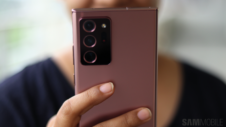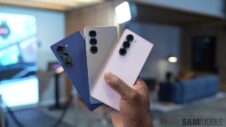The Galaxy Note 20+ will share some camera specifications with the Galaxy S20 series, but exactly what specs will be common across both smartphone lineups remains to be seen. However, leakster Ice Universe claims to have acquired new information regarding the Galaxy Note 20+ model's camera in particular. The information shared on Weibo claims that Samsung's next S Pen flagship will indeed have a periscope-type camera module, but it won't be capable of achieving 100x zoom.
If this information is correct, the periscope lenses employed by the Galaxy Note 20+ will not be paired with the same 48MP sensor used by the Galaxy S20 Ultra. Instead, the periscope-type system will be accompanied by the 13MP ISOCELL Slim 3M5 1/3″ sensor with WDR (wide dynamic range) support. This combo will apparently achieve a maximum hybrid zoom of 50x.
The ISOCELL Slim 3M5 sensor has 1.0um pixels, PDAF, smart WDR, and it's capable of 120fps video recordings. It has an operating temperature of -20 to +70 degrees Celsius, and can output images in RAW10 format.
ISOCELL Bright HM1 and Fast 2L3 sensor are also included
Aside from the ISOCELL Slim 3M5 sensor with periscope-style lenses, the Galaxy Note 20+ camera setup could also feature an ISOCELL Bright HM1 108MP sensor – same as the Galaxy S20 Ultra. The source reiterates this module will no longer be assisted by a ToF sensor as Samsung could be ditching this feature for the Galaxy Note 20. In its place, a laser autofocus system will assist the ISOCELL Bright HM1.
The third and final camera module on the back of the Galaxy Note 20+ would be based on an ultra-wide 12MP ISOCELL Fast 2L3 1/2.55″ sensor with 1.4um pixels, Dual Pixel PDAF, and smart WDR support. It can achieve slow-motion recording of up to 1440fps (cropped 720p), and it can output RAW10 and RAW8 (via DPCM/PCM compression) formats.
All in all, Samsung might be pushing its new camera system to a new level and correct the issues marring the Galaxy S20 Ultra with this new setup. For now, 100x zoom is somewhat of a gimmick rather than an actual useful feature, and 50x is probably enough for any practical uses. The inclusion of a new Dual Pixel PDAF ultra-wide sensor and the switch from ToF to laser autofocus should also be welcomed.







